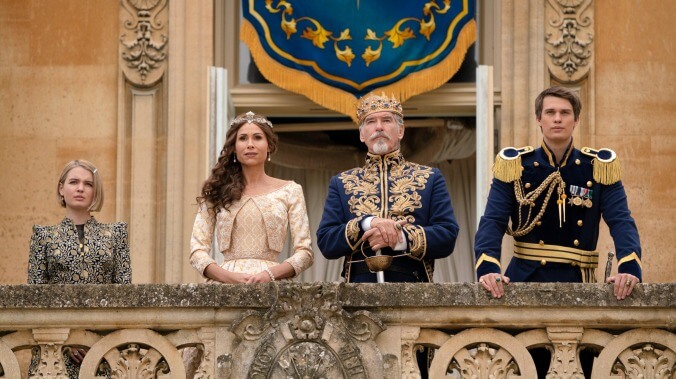Camila Cabello leads a Cinderella for the Mamma Mia! crowd
This fairy-tale jukebox musical is a comedic pop confection aimed squarely at preteens

Consider this fair warning: Writer/director Kay Cannon’s new jukebox-infused take on Cinderella won’t be a glass shoe that fits everyone. Those whose stomachs turn at the mere thought of Cinderella (pop star Camila Cabello) and her prince (Nicholas Galitzine) dueting to an Ed Sheeran song should stay far, far away from this PG-rated comedic pop confection aimed squarely at preteens. But for those who’ve attended a Greatest Showman singalong or fallen down a rabbit hole of Glee covers on YouTube, there’s plenty of fun to be had in its goofily self-aware retelling of the age-old fairy tale. Cannon combines the infectious musical spirit of her Pitch Perfect screenplays with the deadpan comedic sensibility she brought to the teen half of her directorial debut, Blockers, resulting in a movie musical that’s decidedly better than its disastrous trailer suggested. While this version of Cinderella likely won’t top anyone’s list of all-time best adaptations, it’s a winking, glittering family comedy that’s cohesive in tone and confident in what it wants to be. And mostly it just wants to be flashy, toe-tapping karaoke.
Though Cannon reimagines her titular heroine as a would-be fashion designer more interested in building a career than finding a man, the film doesn’t take itself seriously enough for that feminist through line to become didactic. Instead, Cinderella understands that its greatest pleasures lie in a group of immaculately dressed royal ball attendees belting out Salt-N-Pepa’s “Whatta Man” while the prince and his entourage respond with The White Stripes’ “Seven Nation Army.” Cannon keeps the musical numbers coming fast, establishing her film’s fictional kingdom with Janet Jackson’s “Rhythm Nation,” introducing her prince by way of Queen’s “Somebody To Love,” doling out exposition via British rapper Doc Brown, and giving Cinderella the catchy original pop ballad “Million To One.” It’s the same proudly anachronistic spirit that animated A Knight’s Tale, heightened to Broadway musical fever dream proportions—although, sadly, not to the sublime levels of Moulin Rouge! Instead Cinderella owes a lot of its goofily exuberant tone to the Mamma Mia! films, which it lampshades by casting Pierce Brosnan as a bullish king known for his “skull-splitting” singing voice.
As that line suggests, Cinderella has a comedic sensibility that sits somewhere between a self-referential modern day Disney princess flick and—unexpectedly enough—Hulu’s loopy historical dark comedy The Great. (Galitzine has more than a touch of Nicholas Hoult to him.) Cannon mines bone-dry satire from the patriarchal set-up of the film’s fairy-tale monarchy (“Oh it’s a bad system,” the prince admits), and takes advantage of Cabello’s natural knack for comedy without asking her to stretch her acting chops too far. In her first major role, Cabello makes for a plucky, positive Cinderella who never gets bogged down in self-pity or self-doubt, which fits well with the film’s fun-first ethos. And Cannon buoys her first-time leading lady by surrounding her with a charismatic love interest and a solid supporting cast, ranging from a frustratingly underused Minnie Driver to a perfectly underused James Corden.
Unfortunately, the one sequence that really doesn’t work is the one that’s been most heavily featured in the film’s marketing: Billy Porter’s appearance as Cinderella’s “Fabulous Godmother.” A lovely idea in theory, Porter’s take doesn’t fit with either the film’s deadpan comedic sensibility or its later earnestness. It feels carried over from a different movie altogether, and the one-note role doesn’t let Porter show off the phenomenal range he’s brought to projects like Pose and the Broadway musical Kinky Boots. Instead, the real scene stealer turns out to be Idina Menzel, who brings an impressive level of dignity and complexity to Cinderella’s stepmother, who in this version is less evil and more cynically pragmatic. Menzel joins the ranks of Bernadette Peters, Anjelica Huston, and Cate Blanchett as women who’ve put a nuanced spin on the fairy tale baddie—although she’s so far the only one to do so while singing Madonna’s “Material Girl” in front of a hot farm boy.
For those who aren’t inherently put off by its karaoke premise, Cinderella goes down as easily as a pumpkin (carriage) spice latte. Cannon drapes her film in stunning costumes, theatrical production design, and perpetual golden hour lighting, which gives the whole thing the glossy sheen of a high-budget music video. Apart from some terrible CGI mice, Cinderella’s biggest misstep is choosing a lackluster song for its finale—a cardinal sin for a jukebox musical. Jennifer Lopez’s “Let’s Get Loud” lacks the punch needed for a properly rousing closing number, and reflects the way the film loses a bit of steam as it briefly tries to invest in the actual drama of its love story. Still, Cannon at least has fun playing around with the idea of what different kinds of happily ever after can look like. This frothy Cinderella may have all the heft of a helium balloon, but that’s as much a feature as it is a bibbidi bobbidi bug.